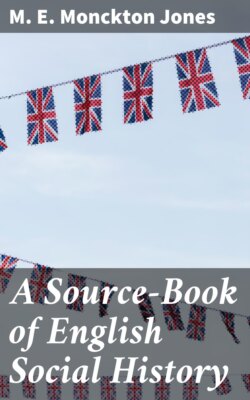Читать книгу A Source-Book of English Social History - M. E. Monckton Jones - Страница 23
На сайте Литреса книга снята с продажи.
INTRODUCTORY NOTES
ОглавлениеTable of Contents
Winchester
An example of full rights of self-government, the city electing its own Mayor and other officers. Citizens are entitled to attend the moot, but are already becoming a close oligarchy, “every worker” not being admitted to the freedom of the city.
Note that shops are uncommon, goods are usually sold at booths erected in market or street.
The “Great Gild” is the Merchant gild comprising all traders; the various crafts have their own gilds but are subject to the Mayor as representative of the Gild Merchant out of which in this case the corporation appears to have arisen, the townhall being called the Gildhall, and rules being enforced to maintain a high standard in commodities sold. The town dues and regulations tend to check the natural growth of industry and to restrict it in favour of freemen of the city.
Bristol
Note here that the crafts are clearly subjected to the Mayor of a Merchant Gild, who has also acquired the right to hold view of frank-pledge, etc.
The Gild of Fullers shows the importance in mediæval gilds attached to keeping up a sound standard of work and value. Thus in addition to protecting their own members as a Trades Union does, they also protected the consumer and general public.
Adam of Gloucester
Here is a case of an outsider claiming the rights of a freeman and resisting the town authority by pleading the king’s. Thus his case is heard in the king’s court of Common Bench and not in either the Mayor’s Court or the Shiremoot.
The extract from the Hereford Iter appears to refer to the same clothier. It illustrates the growth of a demand for written evidence, the lawyer throwing scorn on the value of the tally, though tallies had been commonly used at the king’s Exchequer. The reference to Law Merchant should be noted. Edward I by the Statute of Acton Burnell in 1283 had established courts in certain boroughs in which merchants might have merchant law for the recovery of debts.
Gild of St. Michael, Lincoln
This extract describes the normal doings of a gild, it is of special interest that it insists on equality among its members.
Gild of Tailors, Exeter
Letters Patent, or Charters were often merely confirmations of an already existing gild, sometimes probably dating from Saxon days but having fresh occasion to fear interference on the part of a neighbouring lord or the king, written records having now become the rule in cases of tenure of property. Such charters were often submitted to succeeding kings for confirmation, and where this was not done Charles II was able to make large sums by calling in the ancient charters. This record also shows well the efforts made to keep up a good standard of work, and the extent of the jurisdiction of the gild-authorities.
The Livery Companies
Stow’s account is inserted here to show the unbroken succession of these voluntary associations from Saxon to modern days; though at the Reformation they lost their religious character.
The later trading companies are closely akin to these, but lack the main motive of mutual charity, though they too exist to co-operate in work for which the individuals’ efforts would not suffice. The earliest of them, the Merchant Adventurers, did actually begin as the religious gild of S. Thomas of Canterbury, being joined by Flemings holding a charter to trade from John of Brabant.
